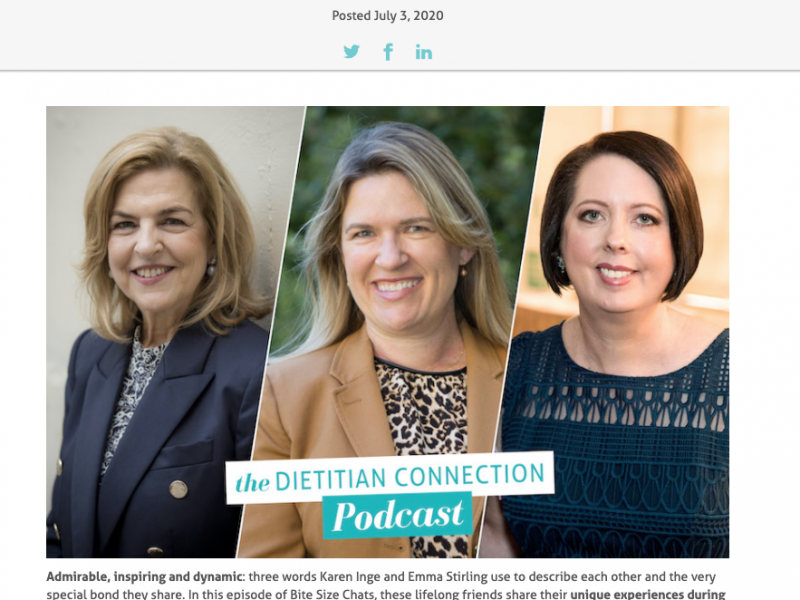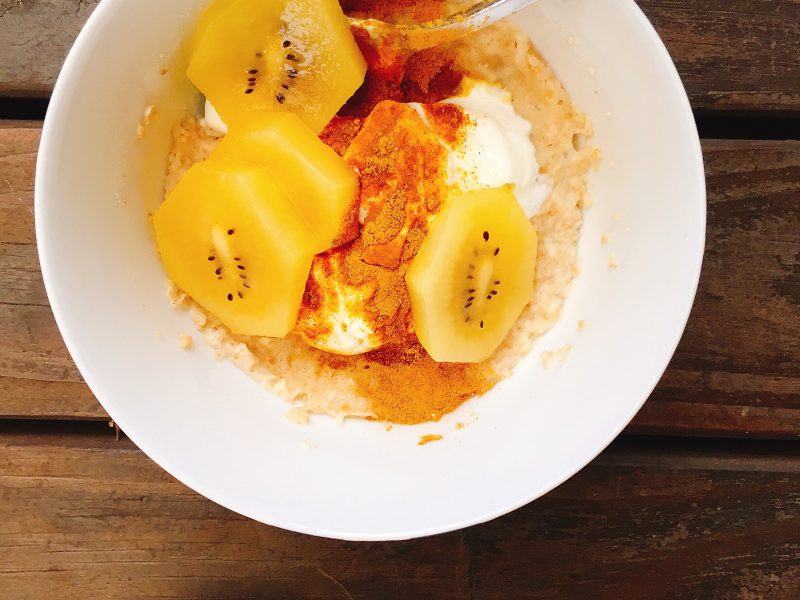Fertility problems were not something I faced personally, but something I have seen have a devastating effect on friends. And just one of those things we don’t talk about openly, nearly enough. So when I found out that my new Registered Dietitian crush used to work in a specialist fertility clinic in New York, I knew we had to bring you the scoop.
About our expert:
Rachelle LaCroix Mallik is a US trained and Registered Dietitian who has been living in Melbourne for a year and just recently moved to Sydney town with her husband. With an additional Masters in Food Studies she’s an expert on food culture and sustainability. One of her clinical areas of experience is fertility nutrition with top IVF Clinics in New York. She’d love to grow her Sydney connections – chat to her on twitter @RMLaCroix and follow her Facebook page the Food Therapist.
Whether you are able to conceive naturally or require fertility treatments such as intrauterine insemination (IUI) or in vitro fertilisation (IVF), nourishing your body with nutritious food can help improve your chances of falling pregnant, having a healthy pregnancy and a healthy bouncing baby. But with so many therapies and whisperers claiming to help, what does the scientific evidence say to date?
Eat Like the Dutch
A 2012 study in the Netherlands assessed the rates of pregnancy for couples undergoing IVF/ICSI (intracytoplasmic sperm injection) six months after receiving preconception counselling on nutrition and found the Dutch dietary recommendations had increased rates of success. The dietary guidelines from the Netherlands Nutrition Center included the following daily intakes: at least four slices of whole wheat bread (or comparable servings of cereals), the use of monounsaturated or polyunsaturated oils, ≥200 g of vegetables, and ≥2 pieces of fruit. Plus weekly recommendations of ≥3 servings of meat or meat substitutes and ≥1 serving of fish.
Caffeine: Drop the Soft Drinks, moderate the Tea and Coffee
Previous research has indicated that a high caffeine intake can have a negative impact on fertility. More recently in 2012, a large Australian study found that caffeine’s effect on time-to-pregnancy differed by the type of beverage consumed. Study researchers associated increased chances of pregnancy with tea consumption and decreased chances of pregnancy with soft drink consumption, but noted there could be a link between type of beverage and lifestyle. I recommend trying to limit caffeine while you are trying to conceive and during pregnancy (up to 200 mg per day, or about 1-2 cups of coffee or 3-4 cups of black tea). Be mindful of added sugar and milk in your tea and coffee, and skip sweetened soft drinks, regular or diet, which provide nothing but sugar, empty calories, and chemicals.

Women – Go for Full Fat
A large study published by the Harvard School of Public Health in 2007 found that women who ate more than two servings a day of low-fat dairy were 85% more likely to be infertile due to ovulatory disorders than those who only ate it less than once a week. On the other hand, women who ate full-fat dairy more than once a day had a 25% lower risk of ovulatory infertility compared to those who ate full-fat dairy foods only once a week. Try including a serve of full-fat yoghurt each day or choose regular instead of skinny milk in your morning lattes.
Men – Skip the Full Fat
A recent 2013 study from Harvard found the opposite effect for men, although there was a smaller sample of 189 young men (ages 18-22). The researchers observed that full-fat dairy intake, particularly cheese, was associated with reduced semen quality, including a negative impact on sperm morphology (shape) and motility (ability to reach egg). Although it is unclear what may cause this dairy-fertility connection, the authors suggest that the oestrogens present in milk may have a negative impact on sperm quality. More research should be done before men rule out dairy completely, but for couples trying to get pregnant, it may be prudent for men to reduce how much milk, cheese, and yoghurt they regularly consume.
Ditch the Big Fish, Choose the Little Fish
Fish consumption offers many benefits, but mercury is something to be aware of when planning a pregnancy. Read more on mercury in the Scoop archive post here.
Embrace “Meat-free Mondays”
A 2008 Harvard study concluded that replacing animal protein sources with vegetable protein sources may reduce ovulatory infertility, particularly for women over 32 years of age. Additionally, the women who consumed vegetable protein instead of carbohydrates also had a lower risk of ovulatory infertility. Try replacing a snack of chips or crackers with a serving of almonds or walnuts and switching to meat free meals at least once per week.

Maintain a healthy weight (neither under nor over-weight)
Body mass index (BMI) may not be the best determinant of a healthy weight, but maintaining a BMI between 20 to 27 kg/m2 has been associated with better chances of achieving pregnancy and delivering for women undergoing IVF. An Australian study of 3586 women who underwent fertility treatments (IVF, ICSI, or embryo transfer) found the pregnancy rates of women with a moderate BMI (20-24.9) were 60 percent higher than the pregnancy rates of very obese women (≥35). Underweight women (BMI <20) also had significantly lower rates of pregnancy than the women in the moderate weight group. A later Dutch study of 8457 women examined the effect of weight on live-birth rates post-IVF and observed that women with a BMI greater than 27 had significantly lower delivery rates than women with a normal BMI (≥ 20 and <27).
Men should maintain a healthy body weight too!
Recently, the BMI of male partners related to fertility treatment has also been investigated and couples have had lower pregnancy rates when the man is overweight. A 2013 study reviewed 290 IVF cycles at a reproductive medical center in New York and found significantly lower pregnancy rates among men with a BMI greater than 25 kg/m2. Although the study found that ICSI (intracytoplasmic sperm injection) improved pregnancy rates by assisting with the egg’s fertilisation, this research indicates the benefit of men maintaining a healthy body weight with regards to fertility, not to mention their overall health. Couples trying to achieve fertility can work together towards better health and potentially pregnancy by eating well and being active.
Cut back on processed meats
Research that was presented at the 2013 Annual Meeting of the American Society for Reproductive Medicine indicated that higher intakes of processed meat products (more than one-third of a serving per day) were associated with more abnormalities in sperm count, size, and shape, compared with men who ate less. Even though the study has a small sample size (156 men), there is solid evidence to support the theory that processed meat can negatively affect men’s health and that daily intake should be reduced, regardless of its association with fertility. Men should limit their intake of salami and sausages and choose lean, unprocessed meats or, even better, have fish or vegetable protein. Surely men can benefit from #5 and #6 as well!
Choose glass containers for leftovers
Minimising exposure to phthalates, which are mainly found in plastics and personal care products, may be beneficial for fertility. Phthalates are known endocrine disruptors, meaning they affect the endocrine system which regulates hormone production and distribution in the body. A study published this year in Fertility and Sterility tested the urinary concentrations of bisphenol A (BPA) and phthalates in men and women. Higher concentrations of phthalates in male urine were associated with a longer time-to- pregnancy. Even though the study found male fertility was more affected by phthalates, both men and women can reduce their exposure. Reheat food or drinks in glass containers or on paper plates, pick BPA- and phthalate-free plastic storage containers, and choose personal care products like deodorant, shampoo, and cosmetics that do not contain phthalates.

Relax
The final tip is to relax. It may be the last thing you want to hear if you are having difficulty getting pregnant, but a study published just this week in Human Reproduction showed that women with the highest levels of alpha-amlyase, an indicator of longterm stress, had more than double the risk of infertility than women with lower alpha-amylase levels. Cortisol levels were not found to negatively impact fertility. Taking steps to reduce your stress, whether yoga, meditation, or practicing mindfulness, won’t hurt and could actually be beneficial towards achieving pregnancy. These are also useful tools for improving your total wellness, mind and body.
Editor’s comment:
Thanks so much Rachelle. I know you’ve stressed that these suggestions will not be able to fix a physical impediment to fertility like blocked tubes, nor are they meant to replace a conversation with a healthcare professional. But they may assist in preventing and addressing ovulatory infertility and can help you be your healthiest self. So much more is needed, but this is an encouraging area of nutrition research.


